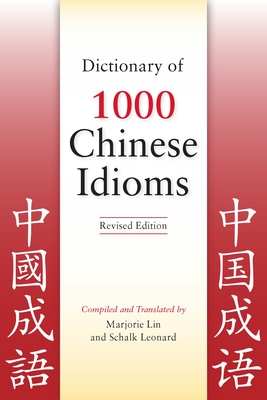Dictionary of 1000 Chinese Idioms, Revised Edition

Dictionary of 1000 Chinese Idioms, Revised Edition
Four-character idioms, also known as chengyu, are key components of the Chinese language and culture, many conveying important lessons and social values that stretch back over 3,000 years of Chinese history. In this essential book, the authors have selected 1,000 of the most frequently used idioms, aphabetized them by their pronunciation in pinyin, and provided both the original Chinese and English translations of the literal and metaphoric meanings. This is a vital resource for any student of Chinese who wants to understand the important nuances of meaning that pervade the language and culture. New features in this edition include: entries that employ both traditional and simplified Chinese characters (so that students may be comfortable with and recognize each); pinyin transliterations with tone marks; and a new introduction by the authors.
Four-character idioms, also known as chengyu, are key components of the Chinese language and culture, many conveying important lessons and social values that stretch back over 3,000 years of Chinese history. New features in this edition include: entries that employ both traditional and simplified Chinese characters, so that students may be comfortable with and recognize each, pinyin transliterations with tone marks, and a new introduction by the authors.
Four-character idioms, also known as chengyu, are key components of the Chinese language and culture, many conveying important lessons and social values that stretch back over 3,000 years of Chinese history. New features in this edition include: entries that employ both traditional and simplified Chinese characters, so that students may be comfortable with and recognize each, pinyin transliterations with tone marks, and a new introduction by the authors.
Four-character idioms, also known as chengyu, are key components of the Chinese language and culture, many conveying important lessons and social values that stretch back over 3,000 years of Chinese history. New features in this edition include: entries that employ both traditional and simplified Chinese characters, so that students may be comfortable with and recognize each, pinyin transliterations with tone marks, and a new introduction by the authors.
Four-character idioms, also known as chengyu, are key components of the Chinese language and culture, many conveying important lessons and social values that stretch back over 3,000 years of Chinese history. New features in this edition include: entrie
PRP: 86.49 Lei
Acesta este Prețul Recomandat de Producător. Prețul de vânzare al produsului este afișat mai jos.
77.84Lei
77.84Lei
86.49 LeiLivrare in 2-4 saptamani
Descrierea produsului
Four-character idioms, also known as chengyu, are key components of the Chinese language and culture, many conveying important lessons and social values that stretch back over 3,000 years of Chinese history. In this essential book, the authors have selected 1,000 of the most frequently used idioms, aphabetized them by their pronunciation in pinyin, and provided both the original Chinese and English translations of the literal and metaphoric meanings. This is a vital resource for any student of Chinese who wants to understand the important nuances of meaning that pervade the language and culture. New features in this edition include: entries that employ both traditional and simplified Chinese characters (so that students may be comfortable with and recognize each); pinyin transliterations with tone marks; and a new introduction by the authors.
Four-character idioms, also known as chengyu, are key components of the Chinese language and culture, many conveying important lessons and social values that stretch back over 3,000 years of Chinese history. New features in this edition include: entries that employ both traditional and simplified Chinese characters, so that students may be comfortable with and recognize each, pinyin transliterations with tone marks, and a new introduction by the authors.
Four-character idioms, also known as chengyu, are key components of the Chinese language and culture, many conveying important lessons and social values that stretch back over 3,000 years of Chinese history. New features in this edition include: entries that employ both traditional and simplified Chinese characters, so that students may be comfortable with and recognize each, pinyin transliterations with tone marks, and a new introduction by the authors.
Four-character idioms, also known as chengyu, are key components of the Chinese language and culture, many conveying important lessons and social values that stretch back over 3,000 years of Chinese history. New features in this edition include: entries that employ both traditional and simplified Chinese characters, so that students may be comfortable with and recognize each, pinyin transliterations with tone marks, and a new introduction by the authors.
Four-character idioms, also known as chengyu, are key components of the Chinese language and culture, many conveying important lessons and social values that stretch back over 3,000 years of Chinese history. New features in this edition include: entrie
Detaliile produsului











